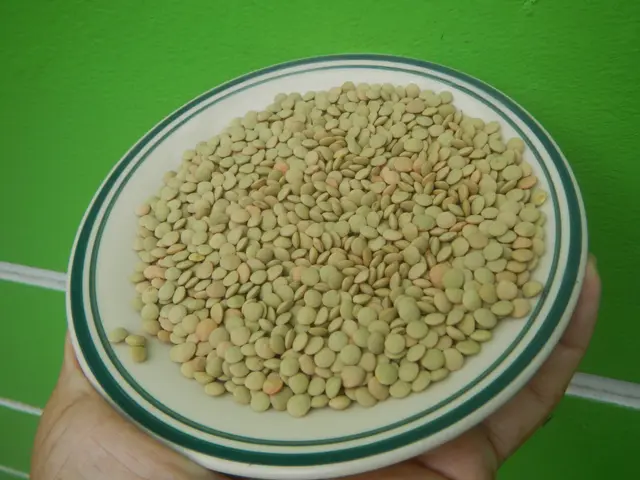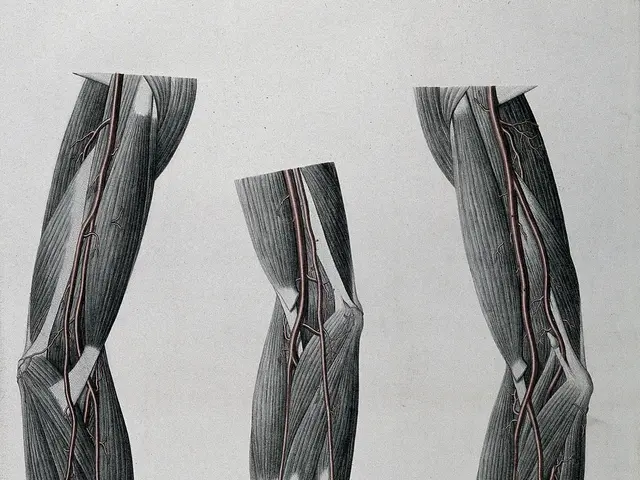Supporting Human Nutrition through Earth's Ecosystems: Cycle of Nutrients Explained
In the intricate dance of life, nutrient cycling plays a crucial role in maintaining the balance that supports both ecosystem health and human nutrition. This process involves various cycles, including carbon, nitrogen, phosphorus, and potassium, each interconnected and essential for life as we know it.
At the heart of life's energy is carbon, a key component of all living organisms, cycled through the atmosphere, plants, animals, and soil through processes like photosynthesis, consumption, respiration, and decomposition. When plants and animals die, decomposers break them down, returning carbon to the soil, ready to be used once more.
Phosphorus, essential for plant growth and reproduction, begins its journey through ecosystems through the weathering of rocks. Plants absorb phosphate ions from the soil and use them to build important molecules like DNA and energy molecules (ATP). Phosphorus is another essential nutrient that is cycled through various processes, including mineral weathering, plant uptake, animal consumption, decomposition, and sedimentation. Animals (including humans) eat plants and take in the phosphorus in the plant tissues. Phosphorus is then used in the body to build bones, teeth, and other important molecules. Decomposition of plants and animals returns phosphorus to the soil, ensuring that new plants can take up phosphorus and continue the cycle.
Nitrogen, an essential nutrient for all living organisms, is cycled through the process of nitrogen fixation, absorption by plants, consumption by animals, decomposition, and denitrification. Nitrogen is important for building proteins and DNA, while phosphorus is important for building strong bones and teeth.
Potassium, an essential mineral for both plants and animals, helps regulate water balance, muscle function, and nerve function. Plants absorb potassium from the soil and use it to maintain cellular functions, water regulation, and overall plant health. Humans obtain potassium by eating fruits, vegetables, and other plant-based foods.
Human nutrition requires key nutrients like carbohydrates, proteins, fats, vitamins, minerals, and water, many of which come from the foods we eat. The quality of those foods depends on the nutrients available in the environment. Nutrient cycling affects human nutrition by maintaining the availability of essential macronutrients, such as nitrogen and phosphorus, in soils, which plants absorb and incorporate into organic molecules like proteins and DNA that humans and other consumers rely on for nutrition.
Ecosystem health is dependent on nutrient cycling, as it ensures the continuous availability of nutrients for plant growth and human nutrition. However, human activities can disrupt nutrient cycling processes, leading to soil degradation, water contamination, and climate change. To support healthy nutrient cycling, it's crucial to practice sustainable agriculture, reduce pollution, conserve natural habitats, and reduce our carbon footprint.
In conclusion, nutrient cycling underpins the foundational nutrient supply chain that sustains plant growth, animal health, and ultimately human dietary quality and health outcomes. By understanding and preserving these cycles, we can ensure a healthier, more sustainable future for all life on Earth.
- Cycling, just like nutrient cycling in ecosystems, plays a vital role in maintaining our health and fitness, as regular exercise like cycling helps build muscle, improves fitness, and promotes overall health and wellness.
- Nutrition, similar to nutrient cycling in the environment, is crucial for our bodies, as it provides the necessary macronutrients, vitamins, and minerals for optimal health and fitness-and-exercise performance.
- Science, particularly environmental-science, has highlighted the importance of nutrient cycling for ecosystem health and human nutrition, emphasizing the intricate relationships between nature, health, and wellness.
- Just as decomposition returns carbon to the soil, ensuring its continuous availability for plants, a balanced diet rich in fruits and vegetables, which are high in potassium, can help maintain the proper water balance, muscle function, and nerve function in our bodies.
- By adopting sustainable practices like organic farming, reducing pollution, and conserving natural habitats, we can promote healthy nutrient cycling, ensuring a healthier, more sustainable future not only for our personal health but also for the health of our planet.







